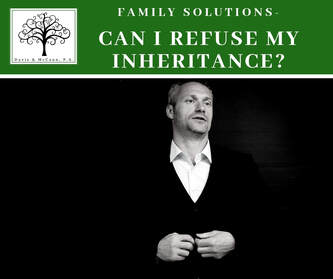 Q: Dad died without a Will or Trust. From what I understand of Kansas law, my sibling and I will share equally in one-half (1/2) of his estate and Mom will inherit the other one-half (1/2). My parents were not economically stable at the time of my father’s death. My sibling and I both are financially comfortable, are not married and have no children. Is there any way we can reject our inheritance, and have it go to our mother so she could live more comfortably? A: Under Kansas probate law, you and your sibling can disclaim your inheritance, which would allow your mother to receive 100% of your father’s estate. If you had children, your share would pass to them, instead of your mother, pursuant to Kansas intestate law. However, in this situation, the disclaimers from you and your sibling would provide for your shares to be redirected to your mother. Disclaimers are used in post-mortem (after death) planning for different reasons. One major reason is to avoid unnecessary tax issues. If a parent leaves his well-off children property this bequest may create future estate tax problems for his grandchildren. If the children disclaim the property now, it can often pass directly to the grandchildren who may not have an estate tax problem. There are a few rules you must also follow if you intend to disclaim inherited property. 1. Written Document. Your disclaimer must (1) be a written instrument describing the property, interest or power you are disclaiming; (2) contain a declaration of disclaimer; and (3) be signed and acknowledged by the disclaimant. 2. Time Limit. States have different laws concerning how long you have to disclaim property, but if you are disclaiming property due to federal estate tax issues, you usually have to file your disclaimer within 9 months of the decedent’s death. Beneficiaries under the age of 21 have additional time to disclaim their interest. 3. No Acceptance. You cannot receive any benefit from the property before disclaiming it. For example, if the property is an investment portfolio, you cannot cash a dividend check and then disclaim the portfolio. If your inheritance is real estate, you can't accept any rent if you intend to later disclaim the property. 4. Zero Control. As the disclaimant, you cannot have any control over whom the property passes after you disclaim it. Disclaimers can be complete or partial. If done correctly, the disclaimant is treated as having predeceased the donor and the property passes to the contingent beneficiary. Better yet, the transfer is not considered a taxable gift. Disclaimers done incorrectly can have serious tax implications. Because the estate tax law changes frequently, you should speak with an experienced estate planning attorney to determine if a disclaimer is appropriate in your situation. Although it may seem like forgoing your inheritance might be in the best interest of your mother, before you run to your attorney and request to disclaim your inheritance share, you should ask if this disclaimer planning strategy is best for your mother’s financial situation. Depending on her care needs, there may be other, more cost effective estate planning strategies that could be used to save your family more money in the long run. For more information, contact Davis & McCann, P. A., Dodge City, KS. We are members of Wealth Counsel, a national consortium of Estate Planning Attorneys and the National Academy of Elder Law Attorneys (NAELA). We focus our practice on providing clients with the best legal advice on Estate Planning, Medicaid and Long-term Care Planning, Family Business/Small Business Succession Planning, Probate, Trust Administration, Real Estate Transactions, and related matters. Comments are closed.
|
NEWS YOU CAN USEDavis & McCann, P. A., Archives
April 2021
Categories
All
|

 RSS Feed
RSS Feed